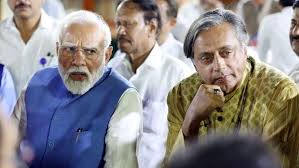PM meets multi-party teams: ‘Need to institutionalise idea’

In a significant move toward bipartisan diplomacy, Prime Minister Narendra Modi recently convened a meeting with multi-party delegations that had undertaken international outreach missions following recent acts of terrorism targeting India. The gathering, held at the Prime Minister’s residence, marked a crucial moment in India’s foreign policy approach — one where internal political divisions were set aside to project a united national front on the global stage. PM Modi, while commending the cross-party efforts, emphasized the need to institutionalise such initiatives to ensure continuity, effectiveness, and impact.
Operation Sindoor: A Unifying Response to Terrorism
The backdrop of this interaction was Operation Sindoor, a large-scale diplomatic effort that involved more than 50 parliamentarians and diplomats from across the political spectrum. These delegations visited over 30 countries, engaging with foreign leaders, parliamentarians, think tanks, and media organizations. Their mission: to convey India’s unwavering stance against cross-border terrorism, particularly in the wake of the Pahalgam terrorist attack that had shocked the nation.
Rather than limiting this campaign to bureaucrats or diplomats, India took a bold step by involving members of various political parties, including the BJP, Congress, NCP (Sharad Pawar), DMK, Shiv Sena (Shinde faction), and others. These leaders represented India not as individuals from different political backgrounds but as a single, united voice against terrorism.
PM Modi’s Endorsement and the Call for Structure
During the nearly two-hour-long interaction, Prime Minister Modi did more than just thank the participants. He actively listened to their feedback, asked questions about their experiences abroad, and reflected on the significance of their efforts.
His key message was both a compliment and a challenge:
“This initiative must not remain a one-off effort. We must institutionalise this idea.”
PM Modi’s emphasis on institutionalising bipartisan diplomacy reflects his vision for a more robust and consistent foreign policy mechanism. He suggested that India establish formal platforms within Parliament that enable regular engagement between Indian lawmakers and their global counterparts.
Why Institutionalising Matters
Institutionalisation ensures continuity beyond governments and political cycles. India has seen numerous instances where foreign policy priorities shifted with the change of government, resulting in loss of momentum and diluted messaging. PM Modi’s suggestion envisions a model similar to the Parliamentary Friendship Groups found in other democracies — structured, long-term engagement platforms between legislators of different countries.
Currently, India has some such groups on paper, but they remain largely inactive or symbolic. The Prime Minister’s vision is to convert these dormant setups into active, functional bodies that collaborate with similar groups abroad, conduct regular exchanges, and provide a parliamentary support structure to India’s foreign relations efforts.
A Moment of National Unity
What made the moment historic wasn’t just the Prime Minister’s words, but the unprecedented political unity on display. Politicians from across ideological divides — such as Congress’ Shashi Tharoor and Manish Tewari, NCP’s Supriya Sule, DMK’s Dayanidhi Maran, and others — joined hands to defend India’s interests globally. Their participation showed that national security and foreign policy can transcend partisan politics when the stakes are high.
Participants shared that they were received warmly in the countries they visited. Many foreign leaders and diplomats appreciated India’s democratic spirit, where even opposition leaders contributed to shaping and communicating international policy goals.
From Outreach to Strategy: The Next Step
The question that now arises is how to transform these individual outreach efforts into a permanent diplomatic strategy. PM Modi’s push toward formalisation could involve several steps:
- Creating a Parliamentary Diplomacy Council: An all-party group tasked with coordinating international visits, foreign engagement plans, and legislative diplomacy.
- Reviving and Activating Parliamentary Friendship Groups: With clear mandates, regular meetings, and annual goals.
- Training and Briefings for MPs: Offering pre-departure briefings to MPs involved in diplomatic outreach so that they carry informed, consistent messages.
- Post-Visit Debriefings and Reports: Requiring MPs to submit structured reports that help track outcomes and shape future strategies.
A Global Need for Domestic Consensus
The move to institutionalise bipartisan diplomacy also sends a clear message to the international community: India is capable of strategic unity despite political diversity. In today’s volatile geopolitical environment — with rising terrorism, shifting alliances, and growing economic interdependence — this consistency can significantly boost India’s credibility.
Countries like the United States and United Kingdom already follow such models, where legislative delegations and cross-party groups play an important role in maintaining global relations. With India aspiring to be a leading voice in the Global South, this shift becomes both timely and necessary.
Conclusion: A New Chapter in India’s Foreign Policy
Prime Minister Modi’s meeting with multi-party delegations is more than a political courtesy. It represents a new chapter in India’s foreign policy thinking — one that recognizes the strength of consensus, the power of democratic dialogue, and the necessity of a structured approach to diplomacy.
As India continues to face challenges like cross-border terrorism, regional instability, and global misinformation, initiatives like these will prove invaluable. Institutionalising bipartisan diplomacy will not only amplify India’s global voice but also redefine national unity in service of international strategy.






